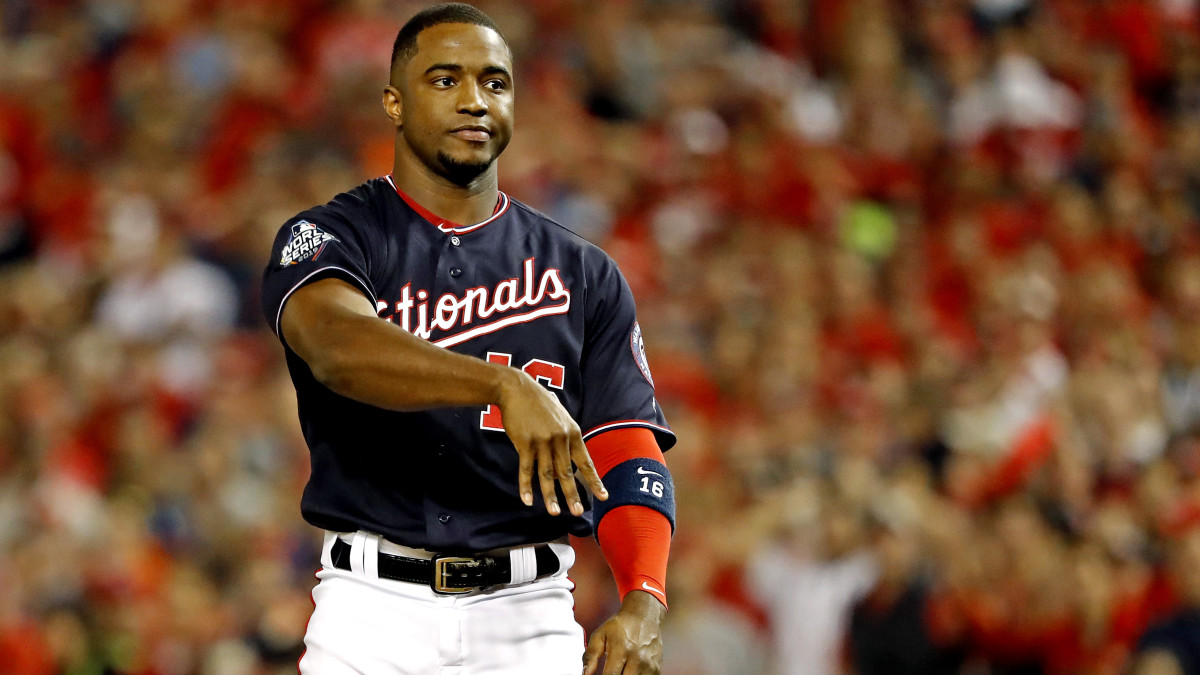Nationals' World Series Run on the Brink After Game of Close–and Missed–Calls

WASHINGTON — The Nationals’ Game 5 dreams—given a sharp yank with the pre-game scratch of Max Scherzer, bruised by a pair of home runs allowed by his substitute, Joe Ross, and steadily sapped by the team’s continued failure to generate any offense at all—took their final twist at the end of the seventh inning.
Juan Soto had juiced the game with a new sense of possibility on a home run straight to center. Two batters later, Ryan Zimmerman worked a walk. Houston’s Gerrit Cole was still on the mound, still sharp, but his last pitch to Zimmerman had been his 104th. It was almost (almost) possible to see him as human now. The Nationals had one on with two outs, down 4-1. Their chances of victory were still low. (10.4%, to be precise.) But this was the closest that they’d been in hours, and given that it was likely the last inning before Houston’s ‘pen would take over for Cole, it was probably the closest that they were going to get.
Victor Robles stepped to the plate. The centerfielder passed on a slider outside, whiffed on a heater, passed on a fastball far outside. The count stood at 2-1. Then Cole froze him on one heater before missing low with another to push the count full. Cole went with the fastball again—outside, it seemed, to just about everyone in the park. Ball four. Robles took a hard step toward first before home plate umpire Lance Barksdale shot his right arm out.
Strike three. Robles had been punched out. The inning was over.
Victor Robles was just the victim of another blown call by Lance Barksdale#WorldSeries pic.twitter.com/IwhFS5JWag
— Umpire Auditor (@UmpireAuditor) October 28, 2019
The Nationals’ fury burst immediately. Robles tossed his gloves and helmet toward Barksdale; Dave Martinez yelled; there were shouts from the dugout and an impressively sustained round of boos from the crowd. There was still more baseball left for them to play. But this was the final turning point that seemed to cement the rest of Game as a formality.
It was, of course, just one call—in a game that was not especially close at the time, and did not end close (7-1), and would not have had any guarantee of ending any closer had it gone the other way. No one in a clubhouse wants to fixate on that or to make excuses. “Frustrating? Sure,” said catcher Yan Gomes, who’d found himself on the wrong end of a different borderline call earlier in the game. “But everyone’s human out there.” That’s baseball (as it is now, at least, with a human ump and his accompanying foibles). But the call also felt like a symbol of the game’s greater thematic question for the Nationals: Can anything go right for us?
For the third consecutive day, they were outplayed by the Astros in just about every capacity. That’s the bottom line of everything that is, and has been, wrong since the team returned to D.C. after going up 2-0. The Astros have established themselves as baseball’s best team over the last six months for a reason, and that’s been on full display over the last three days, in terms of pitching and offense and defense alike. They’ve simply been the better team. That leaves Nationals with everything that they’ve done wrong—and the ghosts of all the what-if turning points that could have gone the other way. These are all the minor reminders of baseball’s fundamental unfairness. What if the call had gone in reverse? What if Scherzer had woken up on Monday and not been rendered immobile by severe back spasms? What if a few well-struck balls had dropped for hits?

“I don’t know how many hard hit balls we had tonight—I don’t even know how you calculate a hard hit ball, I’m sure the computers upstairs could tell us—but Trea had three, I had one, Soto had a couple, Tony was hitting balls in the air,” outfielder Adam Eaton said, running over a list of chances that could have been from his teammates. “I think it’s a combination of both—of that, and they’re making tremendous pitches when they have to. It’s kind of a perfect storm.”
The Nationals’ hardest hit ball came from Trea Turner. It was a lineout. Their second hardest hit came from Howie Kendrick, for a force-out. Of course, that goes both ways—there’s the quality of contact, there’s some fate, and there’s also the positioning of the other team. And, outside of the home run from Soto, none of it has lined up for the Nationals.
“They positioned themselves pretty well,” Martinez said. “But we hit some balls hard.”
To exit with a list of what-if moments is a letdown in and of itself, naturally, at once a collection of adjustments to make and frustrations to move on from. Or, as Turner put it after Game 5:
“That’s baseball.”
It is. And they have at least one more chance to keep playing it.
